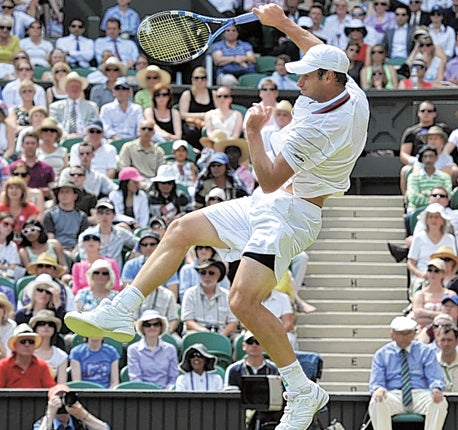Chris McGrath: Spirit and support lift Roddick from danger
American puts last year's epic final defeat behind him to overcome resurgent Llodra

Your support helps us to tell the story
From reproductive rights to climate change to Big Tech, The Independent is on the ground when the story is developing. Whether it's investigating the financials of Elon Musk's pro-Trump PAC or producing our latest documentary, 'The A Word', which shines a light on the American women fighting for reproductive rights, we know how important it is to parse out the facts from the messaging.
At such a critical moment in US history, we need reporters on the ground. Your donation allows us to keep sending journalists to speak to both sides of the story.
The Independent is trusted by Americans across the entire political spectrum. And unlike many other quality news outlets, we choose not to lock Americans out of our reporting and analysis with paywalls. We believe quality journalism should be available to everyone, paid for by those who can afford it.
Your support makes all the difference.Half an hour before kick-off in Port Elizabeth, the Centre Court crowd sensed that Andy Roddick and Michael Llodra were approaching a defining passage in what was proving a vintage exhibition of serve-and-volley. "Come on Andy!" implored one voice. "Come on Michael!" retorted another. "Come on England!" suggested a third, to suitable merriment. But while some minds were straying elsewhere, their focus should perhaps have been restored by Roddick's success, 4-6, 6-4, 6-1, 7-6.
For here was a man to show how an unrequited craving can be consuming, without becoming corrosive. And here, come to that, is a man who might also reproach his hosts that they are not alone in their patriotic anxieties. The Americans have not won a Grand Slam since Roddick won the only one of his career to date, on home soil at Flushing Meadows in 2003, and nowadays he finds himself clinging on alone in the top 10, as well. But whatever sense of entitlement might mislead a nation, whether in lamenting the solitude of Andy Murray's challenge or the interval of "hurt" since 1966, Roddick's very individuality mocks any dread of some inexorable, shared malediction.
If ever a player could persuade himself that destiny had fortified this place against a talent perfectly tailored to its demands, it was surely Roddick after the first set yesterday. The last time he was in this arena, of course, he lost a Wimbledon final to Roger Federer for the third time, through that unforgettable 16-14 slog for the final set. Now he had thrown in his path as ghastly a match as he could possibly expect so early in the tournament.
Three years his senior, at 30, Llodra has been around for a good while, and had only won five of his 14 previous matches here. Since teaming up with Amélie Mauresmo, however, he had discovered a new lease of life not so much as a grass specialist, but as a downright herbivore. His success at Eastbourne last week exalted him to 37 in the world, and the left-hander's sumptuous start left no doubt that he represented a real banana-skin.
Roddick launched a fusillade of three aces in his opening game, but the Frenchman soon had him on the radar. Llodra won every point in Roddick's third service game, showing delicacy and imagination at the net, and never let him back into the set. Indeed, he closed out with consecutive aces, one down the centre and the other slicing wide.
And while their styles complemented each other very pleasingly, the contrast in their physical deportment by no means flattered Roddick. Llodra was so light on his feet, and elegant in his reach, that he must have given Roddick nightmarish glimpses of Federer himself. The American himself marched around with that familiar machismo, restlessly hitching his shirt and adjusting his cap between points, as though physically rebelling at the latent pathos of his Wimbledon quest.
It took initiative, courage and sheer class to turn things round. "I had to make an adjustment," he said afterwards. "The game he broke me was one of the best return games someone [ever] played against me. Off my serve, I had to start coming in. He was pretty comfortable chipping, and coming in at random spots. He was dictating. I think that was key."
Admittedly there were those who discerned in Llodra's brittle display, in the heart of the match, a less welcome symmetry with his new coach, who had to overcome her notoriety for mental fragility to win the women's title here in 2006. Serving to keep the second set alive, he was broken to love and Roddick scented blood. He left his chair early, so that Llodra could see him prowling impatiently around the baseline, and promptly raced away with the third set.
Llodra retrieved his dignity and rhythm to force a tie-break in the fourth, but Roddick required only the first of four match points and, entering the spirit of things, triumphantly kicked a ball into the crowd. Their response permitted no doubt that his gracious deportment, after his marathon with Federer last year, has secured him a freehold on their affection.
"Right or wrong, I feel they maybe appreciate the body of work I've put together at this tournament," he said. "It's gratifying, and humbling as well. But I've been very conscious I can't play these matches for last year. It's a separate tournament. There's no sense of entitlement. I have to get through one match at a time."
And if that came straight from the World Cup manual, then perhaps Murray's quest should be perceived in an equally pragmatic way. Roddick is very much at home here, too. But he does not find his belief in the courts that suit him so well, or the crowds that cherish him. He finds it all within.
Join our commenting forum
Join thought-provoking conversations, follow other Independent readers and see their replies
Comments